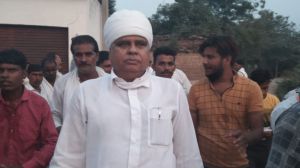Commitment matters
His slow black-robed walk down the courtroom corridor, his daily media durbar held outside the courtroom, his sarcasm and anger while demoli...

His slow black-robed walk down the courtroom corridor, his daily media durbar held outside the courtroom, his sarcasm and anger while demolishing the police version 8212; Zahira Sheikh and the other Best Bakery victims will realise the full significance of Pheroze R. Vakil8217;s sudden death as the trial progresses. It was not for nothing that Vakil was selected to be the Special Public Prosecutor for this case. In a similar case in Mumbai in 2001, his performance was outstanding.
In the dock was one of Mumbai8217;s most high-profile ex-police commissioners. The charge was murder; the case was fool-proof. Yet, it was only thanks to Vakil that the chargesheet became so bulky it needed a special bag.
Left to the Special Task Force STF set up by the then Home Minister Chhagan Bhujbal to act upon the Srikrishna Commission Report, R.D. Tyagi and his 17 co-accused policemen would have sailed through their prosecution, as have other policemen chargesheeted by the STF for their role in the 8217;92-8217;93 riots, as have the Gujarat riot-accused.
For Vakil, the police8217;s actions were not routine, as they were for the government and the STF. Despite his decades-long experience as a criminal lawyer, Vakil was shocked at the police8217;s unwarranted brutality against innocents, and determined to see Tyagi in custody. It was a treat to watch him go about doing this.
Despite his age and his hearing deficiency, Vakil led an active social life. A late riser, he would sail into office around lunch. Finding the hearing just two hours away, he would start hollering at his clerk, a mild-mannered man who always heard him out with bowed head. Soon, the bumbling STF officers would make an appearance, without the documents he had asked for. Finally, Vakil would stride into court, clerk and inspector in tow, and the buzz in the packed room would stop.
But even a PP as committed as Vakil had to follow client8217;s instructions. It wasn8217;t until public pressure forced Bhujbal to give him the go-ahead, that Vakil went all out in opposing Tyagi8217;s anticipatory bail application. He argued for five days, taking apart the case cooked-up by the police. Anticipatory bail was denied, but even Vakil couldn8217;t get Tyagi behind bars. The STF saw to it that Tyagi spent his 8216;8216;custody8217;8217; in a five-star hospital.
When it came to Tyagi8217;s co-accused, the 17 policemen who had carried out the assaults and fired the shots, the same Vakil told the court their custodial arrest wasn8217;t needed. Again, he was following instructions: the government had made it clear it didn8217;t want them to lose their jobs.
When Tyagi and his men applied for a discharge a year later, the same government did not even inform Vakil, who had single-handedly convinced two judges that a prima facie case of murder existed against them. Tyagi and nine policemen walked free without having had to face a trial.
- 01
- 02
- 03
- 04
- 05































